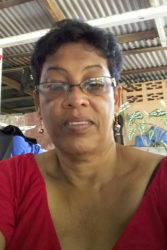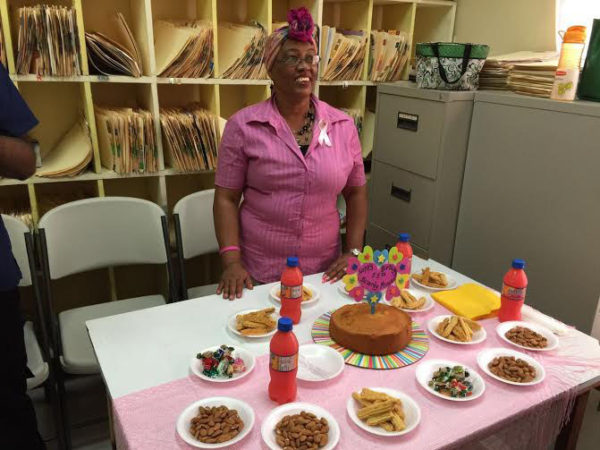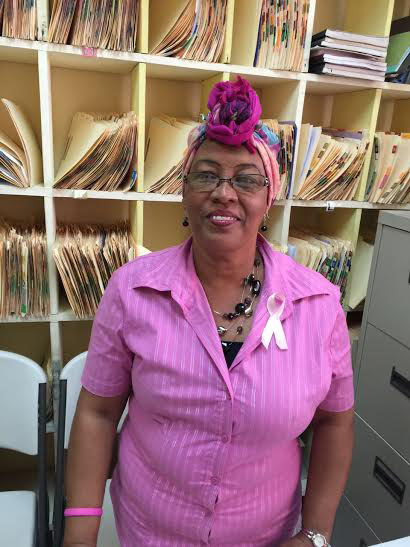When Beverley Ann Munesar found out last year that she had breast cancer, she accepted it as a challenge that she was prepared to fight and win.
“I stood outside the hospital and I cried for five minutes. But then I raised both hands to heaven and I said, ‘Jesus you are my healer and by your stripes I shall be healed. Please let your presence go before me and help me to fight these battles that I am facing now,’” she recalled in a recent interview with Stabroek News.
That was on September 10 last year. While most people would have been depressed or sad about the diagnosis, Munesar was not.

“Being a cancer patient… I told myself when I started treatment that I will have to fight through some bad days to gain the best days of my life and being so positive, I said I am going to be grounded,” she said.
According to Munesar, she was diagnosed with Stage 2 cancer in her right breast and has since been receiving chemotherapy and radiation treatment at the Cancer Institute of Guyana. “Eight cycles of chemotherapy were recommended and I also had to do 25 sessions of radiation. The radiation treatment began in March and finished in April and I am left with the final cycle of chemotherapy which should be completed on the 27th of this month,” she said.
Munesar recalled that she was in Canada when she first noticed something was amiss. “I went to Canada on holiday and that is when I told my in-laws that something is not right with me,” she recounted.
“I am a family-oriented person so I decided that I am going to let them see and let them know what is going on with me. I lifted my nightgown and I said ‘I know something is not right here’ but then the time was not sufficient enough for me to see a doctor there because I was preparing to travel back home for the reopening of school,” the head teacher said.
Her battle began upon her return. “I visited the West Demerara Hospital where they did an ultrasound and a mass was seen and I remembered that my daughter had a friend at Woodlands Hospital and I called and told her ‘… can you make an appointment for me to have the mammogram done at Woodlands,’” the woman recounted.
She said this was done and she was encouraged to make an appointment at the Cancer Institute which she later did. “I had a biopsy done on the 14th of September and a mastectomy was recommended by the surgeon, Dr Ravi Inchangod. I must say that I felt very confident after speaking with Dr Ravi and he said that I must make up my mind about what I am going to do. I told him that I have to discuss it with my family. We left and we went by my daughter in Campbellville and my son-in-law told me that if I am feeling comfortable and if I can do it then let us give it a try and we did it,” she related.
The surgery went well. “I had a very successful surgery at St Joseph Mercy Hospital. The doctors and nurses there were very wonderful. I got the support from everyone that I needed. I kept calling on Jesus name because I said only he can help me. I put God first in my life then I placed the doctors and the nurses,” she said.
Asked if the family has a history of breast cancer or cancer, Munesar replied, “I never knew that my family members had it. Technology was not advanced those years ago. You used to hear people dying out and so forth but you never knew what they died from. Never had the opportunity to say ‘okay, yes these people died from cancer.’ Not until I was diagnosed with cancer then you had other relatives coming from far and near saying that well the old lady or the old man passed away from cancer,” she related.
With the chemotherapy treatments, one of the worst side effects is the loss of hair. Most women often fall into depression at the thought of losing their hair. Munesar said this was one of the first things she heard from other cancer patients. “When I came to the Cancer Institute and I met with some colleagues here, the ladies, some of them said ‘well you know your hair is going to drop’. I said ‘I know.’ They said ‘you are going to cry when that hair drop’. I said ‘no’ and they said ‘we can tell you that’ because they know when their hair came off,” she recalled.
Two weeks later, Munesar said, it started happening to her. “My hair started to fall and I told my husband that it is going to make a mess of my linens and my clothing so I told him to take the hair off,” she recounted.
While many would have seen that as a tough decision to make, Munesar said, “I told my husband I wanted him to take it off and he asked me if I think I am ready to take the hair off. I told him yes. I took off my clothes and I sat on a chair in the bathroom and he took the cutting machine… I raised my hands to heaven and I said ‘God you are in charge. I just wanna ask you God to give me the strength and the faith when this hair is taken off and I look at myself in the mirror and I see that face I must be able to say, Beverley this is me and I am so beautiful,’” she laughingly recounted.
“It just went the way that I asked God and it went the way that God had wanted it,” she added.
Munesar credits her positive attitude for getting her through every day and even the thought of no longer having hair on her head. “I never really had a bad depressing day. I mean the feelings were not that good every day, but [I had a] positive attitude. I said that celebrities pay so much money for bald head and look I get it,” she laughed.
Her advice to other women is to get checked early since prompt detection is important to fight cancer. “I would tell the women to get started early. Probably if I was checking earlier, I could have known what I was suffering from. Bear it in mind that I used to visit a lot of doctors but they never said I have cancer; they did all the tests. I went to Balwant Singh, Woodlands, all they said they are not seeing anything is wrong with me,” she related.
“I wanna tell them to visit the doctor, do your mammogram. If you are feeling pain anywhere get an ultrasound done because ‘too little, too late’ is going to be the cry. Sometimes we sit and say we are going to wait and see. You are not the doctor to say you are going to wait and see. We have to start looking at ourselves,” she urged.
“As women we have to come off from this pride. Sickness is not for a cat and a dog. We get sick too. We have to be focused and don’t ever tell yourself that is the end of the world. Be positive,” Munesar emphasised.
“Depression and stress kills you out. Women on the whole like to hide sickness but… if anything is wrong with you, my sister, you take it to God. Tell it to your friends and family and you would be amazed to know the support you can get,” she said.
A head teacher at the Sans Souci Nursery School in Wakenaam, Munesar said the constant trips to the doctor and for treatment, resulted in her being placed at the Zeelugt Nursery School. “I am at Zeelugt Nursery until the end of this month when I retire. God just work it out. He worked out things so wonderfully for me,” she said.
She lauded the treatment at the Institute which she says has been nothing short of marvellous. “I have found joy in coming here and God has given me the opportunity to meet with other patients here,” the woman said.
“I had the opportunity to share with them and tell them about coming off about this depression and stress and I had the opportunity pray with them. I told them when I become a survivor and I come to Georgetown, I will make it possible to come once a month to lift the spirits of the patients just to motivate them,” she said.
Her husband, Rabindranauth Munesar, meantime, said the journey has been a tough one for him. “If I wasn’t there for her sometimes, she would have crumbled. It was especially tough for me because I had to give up everything home in Wakenaam. After retirement, I went into farming and here is where I had to give up the planting of the rice. I lose 600 bunches of plantain and all my cows. I just leave them there. But it was worth it,” he said.
“The journey was also painstaking. I have to come all the way with her and go through all the pains with her. But it was good at the end of the day,” he said.
Asked what it was like having to cut his wife’s hair off, he said: “I told her that you have to prepare for this. This is what you will have to live with for a couple of months.”
They both expressed thanks not only to their family and friends but also to the staff at the Cancer Institute along with the Ministry of Education for their support and encouragement.










